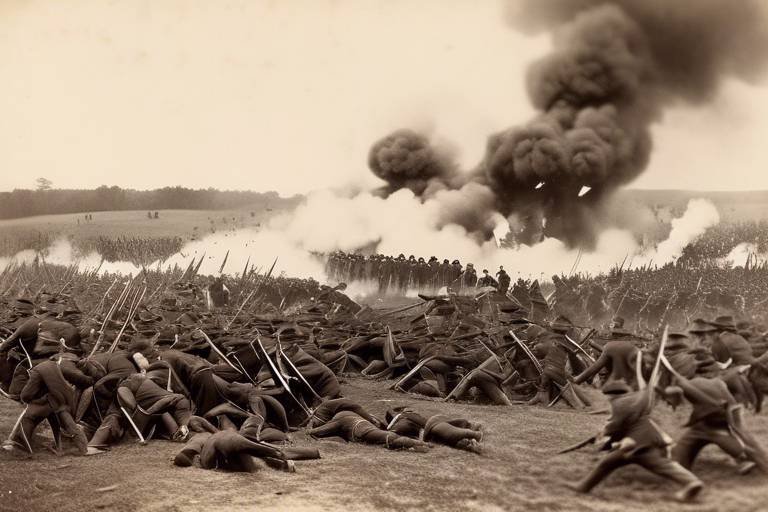The Impact of the Enlightenment on Modern Democracies
The Enlightenment era has left an indelible mark on modern democracies, shaping the very core of their foundations. It was a time of intellectual explosion, where ideas flourished like fireworks in the night sky, illuminating the path towards individual rights, freedom of expression, and the separation of powers.
As the flames of Enlightenment ignited in the 17th and 18th centuries, luminaries like John Locke, Montesquieu, and Rousseau emerged as beacons of reason, advocating for a society built on the pillars of logic, science, and individualism. Their philosophies laid the groundwork for the democratic principles we hold dear today.
Central to the Enlightenment ideals were the concepts of individual rights and liberties. The notion that every person is entitled to freedom of speech, religion, and assembly became a rallying cry that reverberated through the corridors of power. These principles found their way into the very fabric of modern democratic constitutions, serving as guardians of civil liberties in a world fraught with challenges.
One of the cornerstones of Enlightenment philosophy was the social contract theory, championed by Rousseau among others. This theory posited that the legitimacy of government hinges on the consent of the governed, giving rise to the democratic principle of popular sovereignty. It was a revolutionary concept that shook the foundations of traditional governance and paved the way for a new era of accountability and transparency.
Montesquieu's theory of the separation of powers was another explosive idea that reshaped the landscape of governance. By dividing government into three branches – legislative, executive, and judicial – Montesquieu sought to prevent the concentration of power in the hands of a few and ensure that checks and balances remained the cornerstone of democratic systems.
Enlightenment ideals also championed tolerance, pluralism, and the acceptance of diverse viewpoints. These values, deeply ingrained in the fabric of modern democracies, serve as a bulwark against tyranny and oppression, fostering inclusivity and safeguarding the rights of minorities.
The impact of the Enlightenment on political institutions cannot be overstated. It challenged age-old norms and ushered in a new era of governance based on principles of accountability, transparency, and the rule of law. The echoes of this seismic shift can still be heard in the halls of power today, guiding the hand of those who seek to uphold the tenets of democracy.
Education became a powerful tool in the dissemination of Enlightenment ideas, empowering individuals to engage in the democratic process with knowledge and critical thinking. The emphasis on education continues to shape modern educational systems, ensuring that future generations are equipped to navigate the complexities of a democratic society.
The legacy of the Enlightenment extends far beyond the borders of Europe, influencing movements for democracy and human rights on a global scale. However, challenges persist in applying Enlightenment principles in diverse cultural and political contexts, underscoring the ongoing struggle to uphold the ideals of reason and liberty in an ever-changing world.

Origins of Enlightenment Ideals
The Enlightenment era significantly influenced the development of modern democratic systems, shaping concepts of individual rights, freedom of expression, and the separation of powers. This article explores how Enlightenment ideals continue to resonate in contemporary democratic societies.
The Enlightenment period emerged in the 17th and 18th centuries, characterized by a focus on reason, science, and individualism. Thinkers like John Locke, Montesquieu, and Rousseau laid the foundation for democratic principles.
During this intellectual movement, a shift towards valuing reason and empirical evidence over traditional authority took place. Philosophers of the Enlightenment challenged the prevailing beliefs of the time, advocating for the rights of individuals and the importance of critical thinking.
John Locke, known for his theories on natural rights and the social contract, emphasized the inherent rights of individuals to life, liberty, and property. His ideas laid the groundwork for the concept of individual rights that became central to modern democratic societies.
Montesquieu's work on the separation of powers was revolutionary in its proposition to divide government functions into distinct branches to prevent tyranny and ensure a system of checks and balances. This idea became a cornerstone of democratic governance, influencing the design of political systems worldwide.
Rousseau's social contract theory, which posited that legitimate political authority arises from the consent of the governed, challenged the notion of absolute monarchy prevalent at the time. His ideas contributed to the development of the democratic principle of popular sovereignty, where power ultimately resides with the people.
The Enlightenment thinkers collectively advocated for the pursuit of knowledge, individual rights, and the application of reason to societal issues. Their ideas laid the groundwork for modern democratic values and institutions, shaping the course of history in profound ways.

Individual Rights and Liberties
The Enlightenment era significantly influenced the development of modern democratic systems, shaping concepts of individual rights, freedom of expression, and the separation of powers. This article explores how Enlightenment ideals continue to resonate in contemporary democratic societies.
The Enlightenment period emerged in the 17th and 18th centuries, characterized by a focus on reason, science, and individualism. Thinkers like John Locke, Montesquieu, and Rousseau laid the foundation for democratic principles.
Enlightenment philosophers emphasized the importance of individual rights, such as freedom of speech, religion, and assembly. These ideas influenced the framing of modern democratic constitutions and the protection of civil liberties.
The concept of the social contract, popularized by Enlightenment thinkers like Rousseau, proposed that government legitimacy stems from the consent of the governed. This idea underpins the democratic principle of popular sovereignty.
Montesquieu's theory of the separation of powers, dividing government into three branches, influenced the design of modern democratic systems to prevent the concentration of power and ensure checks and balances.
Enlightenment ideals promoted tolerance, pluralism, and the acceptance of diverse viewpoints. These values are fundamental to modern democracies, fostering inclusivity and the protection of minority rights.
The Enlightenment challenged traditional forms of governance, leading to the establishment of democratic institutions based on principles of accountability, transparency, and the rule of law.
Education became a key tool for spreading Enlightenment ideas and empowering individuals to participate in the democratic process. The emphasis on critical thinking and knowledge continues to shape modern educational systems.
The Enlightenment's legacy extends beyond Europe, influencing movements for democracy and human rights worldwide. However, challenges persist in applying Enlightenment principles in diverse cultural and political contexts.
Q: How did the Enlightenment impact modern democratic values?
The Enlightenment laid the groundwork for concepts like individual rights, separation of powers, and popular sovereignty, which are core principles of modern democracies.
Q: Why is tolerance important in a democratic society?
Tolerance promotes inclusivity, respect for diverse opinions, and protection of minority rights, creating a more harmonious and democratic environment.
Q: What role did education play in spreading Enlightenment ideals?
Education was crucial in disseminating Enlightenment ideas, empowering individuals to engage in critical thinking and participate in shaping democratic societies.

Social Contract Theory
The Enlightenment era significantly influenced the development of modern democratic systems, shaping concepts of individual rights, freedom of expression, and the separation of powers. This article explores how Enlightenment ideals continue to resonate in contemporary democratic societies.
The Enlightenment period emerged in the 17th and 18th centuries, characterized by a focus on reason, science, and individualism. Thinkers like John Locke, Montesquieu, and Rousseau laid the foundation for democratic principles.
Enlightenment philosophers emphasized the importance of individual rights, such as freedom of speech, religion, and assembly. These ideas influenced the framing of modern democratic constitutions and the protection of civil liberties.
The concept of the social contract, popularized by Enlightenment thinkers like Rousseau, proposed that government legitimacy stems from the consent of the governed. This idea underpins the democratic principle of popular sovereignty.
Montesquieu's theory of the separation of powers, dividing government into three branches, influenced the design of modern democratic systems to prevent the concentration of power and ensure checks and balances.
Enlightenment ideals promoted tolerance, pluralism, and the acceptance of diverse viewpoints. These values are fundamental to modern democracies, fostering inclusivity and the protection of minority rights.
The Enlightenment challenged traditional forms of governance, leading to the establishment of democratic institutions based on principles of accountability, transparency, and the rule of law.
Education became a key tool for spreading Enlightenment ideas and empowering individuals to participate in the democratic process. The emphasis on critical thinking and knowledge continues to shape modern educational systems.
The Enlightenment's legacy extends beyond Europe, influencing movements for democracy and human rights worldwide. However, challenges persist in applying Enlightenment principles in diverse cultural and political contexts.
Q: How did the Enlightenment influence modern democratic systems?
A: The Enlightenment introduced ideas of individual rights, separation of powers, and popular sovereignty that are foundational to modern democracies.
Q: What role did education play in spreading Enlightenment ideals?
A: Education was crucial in disseminating Enlightenment principles, empowering individuals to engage in democratic processes and critical thinking.
Q: Are there challenges in applying Enlightenment values globally?
A: Yes, adapting Enlightenment principles to diverse cultural and political contexts poses challenges, despite its global influence.

Separation of Powers
The concept of the separation of powers, as proposed by Montesquieu during the Enlightenment era, remains a cornerstone of modern democratic governance. This principle advocates for the division of governmental responsibilities into distinct branches to prevent any single entity from gaining unchecked power. By creating separate branches for the legislative, executive, and judicial functions, the system establishes a system of checks and balances that ensures accountability and prevents tyranny.
Montesquieu's theory was revolutionary in its time, challenging the prevailing notions of absolute monarchy and centralized authority. By distributing power among different branches of government, the separation of powers aims to safeguard individual liberties and prevent any one branch from becoming too dominant. This framework not only limits the potential for abuse of power but also fosters a more transparent and accountable government.
Through the separation of powers, each branch of government is granted specific responsibilities and authorities, delineated by the constitution. The legislative branch is tasked with creating laws, the executive branch enforces them, and the judicial branch interprets and applies the laws. This division ensures that no single branch can exert undue influence over the others, promoting a system of mutual oversight and cooperation.
Moreover, the separation of powers serves to protect the rule of law by establishing clear boundaries between the branches of government. This framework helps prevent arbitrary actions by any one branch and upholds the principles of justice and fairness. By maintaining distinct spheres of influence, the separation of powers contributes to the stability and integrity of democratic institutions.
Overall, the concept of the separation of powers reflects the Enlightenment ideals of balance, accountability, and the limitation of governmental authority. By structuring governance in this manner, modern democracies strive to uphold the values of liberty, equality, and justice that are fundamental to a free and democratic society.

Tolerance and Pluralism
During the Enlightenment era, the promotion of tolerance and pluralism emerged as significant ideals that continue to shape modern democracies. The concept of tolerance, advocated by thinkers like Voltaire and John Locke, emphasized the acceptance of diverse viewpoints and beliefs within society. This notion paved the way for the protection of individual freedoms and the recognition of minority rights as essential components of a democratic society.
Pluralism, a key principle stemming from Enlightenment philosophy, highlights the value of diverse perspectives and the coexistence of different ideologies within a community. By fostering an environment where multiple voices can be heard and respected, pluralism contributes to the vibrancy and inclusivity of democratic societies. It encourages dialogue, mutual understanding, and the peaceful resolution of conflicts through respectful engagement.
Enlightenment ideals of tolerance and pluralism have influenced the development of laws and policies that safeguard the rights of individuals from various backgrounds, beliefs, and cultures. These principles serve as a foundation for promoting social harmony, upholding human dignity, and fostering a sense of unity amidst diversity.

Impact on Political Institutions
The Enlightenment era had a profound impact on political institutions, challenging traditional forms of governance and paving the way for the establishment of democratic systems rooted in principles of accountability, transparency, and the rule of law. Prior to the Enlightenment, monarchies and absolute rulers held unchecked power, often leading to tyranny and oppression. However, Enlightenment thinkers advocated for a more balanced distribution of power to prevent abuses and protect the rights of citizens.
One key concept that emerged from the Enlightenment was the idea of government legitimacy deriving from the consent of the governed. This notion, popularized by philosophers like Rousseau, laid the foundation for the democratic principle of popular sovereignty, where the authority of the government is derived from the will of the people. This revolutionary idea reshaped the relationship between rulers and the ruled, emphasizing the importance of representation and civic engagement in political decision-making.
Furthermore, the Enlightenment's emphasis on reason and rationality influenced the design of political institutions to ensure checks and balances. Montesquieu's theory of the separation of powers, which advocated for the division of government into three branches – legislative, executive, and judicial – aimed to prevent the concentration of power in the hands of a single entity. This system of checks and balances became a cornerstone of modern democratic governance, safeguarding against potential abuses of power and promoting accountability.
In addition to structural reforms, the Enlightenment fostered a culture of political participation and civic engagement. The idea that individuals have the right to actively participate in shaping their government and holding leaders accountable became ingrained in democratic societies. This shift towards greater citizen involvement in political processes marked a departure from autocratic rule towards more inclusive and representative forms of governance.
Overall, the Enlightenment's impact on political institutions was transformative, laying the groundwork for the development of democratic systems that prioritize the rights and freedoms of individuals, promote transparency and accountability, and uphold the rule of law.

Education and Enlightenment
The Enlightenment era heralded a new approach to education, viewing it as a means to spread knowledge and empower individuals to engage in critical thinking. Education became a cornerstone in disseminating Enlightenment ideals, fostering a society where individuals could actively participate in the democratic process. Think of education during the Enlightenment as a beacon of light illuminating minds, igniting a spark of curiosity and reasoning in the hearts of learners. It was not merely about memorizing facts but about cultivating a spirit of inquiry and analysis, equipping individuals with the tools to question authority and seek truth.

Global Influence and Challenges
The Enlightenment's legacy extends far beyond the borders of Europe, leaving a lasting impact on movements advocating for democracy and human rights across the globe. Its principles of individual liberty, equality, and the rule of law have inspired revolutions and reforms in various regions, shaping the political landscape of many nations.
However, applying Enlightenment ideals in diverse cultural and political contexts presents significant challenges. Different societies have unique histories, values, and structures that may not always align seamlessly with the Enlightenment's universal principles. Adapting democratic systems to respect local traditions while upholding fundamental rights requires careful navigation and consideration.
Furthermore, the legacy of colonialism and imperialism has influenced the reception of Enlightenment ideas in former colonies, where historical power dynamics and inequalities continue to shape political discourse. Balancing the promotion of democratic values with respect for cultural autonomy remains a complex and ongoing challenge in the global dissemination of Enlightenment principles.
Frequently Asked Questions
- What is the Enlightenment era?
The Enlightenment era, also known as the Age of Enlightenment, was a period in the 17th and 18th centuries marked by a focus on reason, science, and individualism. It was a time of intellectual and philosophical growth that significantly influenced modern democratic principles.
- Who were some key figures of the Enlightenment?
Notable figures of the Enlightenment era include John Locke, Montesquieu, and Jean-Jacques Rousseau. These thinkers played a crucial role in shaping democratic ideals such as individual rights, social contract theory, and the separation of powers.
- How did Enlightenment ideals impact modern democracies?
The Enlightenment ideals of individual rights, social contract theory, and the separation of powers laid the foundation for modern democratic systems. These principles continue to influence the structure of governments and the protection of civil liberties in contemporary societies.
- Why is education considered important in spreading Enlightenment ideas?
Education was a key tool in disseminating Enlightenment ideas and empowering individuals to participate in the democratic process. By promoting critical thinking and knowledge, education continues to play a vital role in upholding democratic values and principles.
- What challenges exist in applying Enlightenment principles globally?
While the Enlightenment's legacy has had a global impact on movements for democracy and human rights, challenges persist in implementing these principles in diverse cultural and political contexts. Adapting Enlightenment ideals to different societies remains a complex and ongoing process.



















